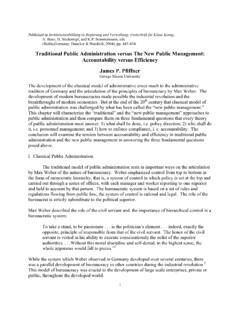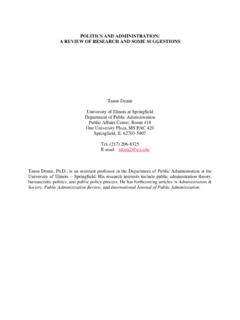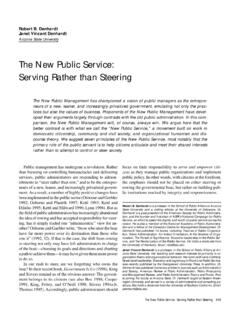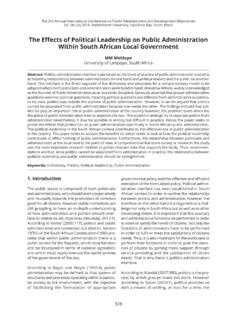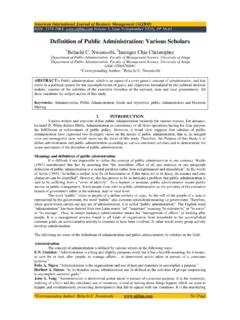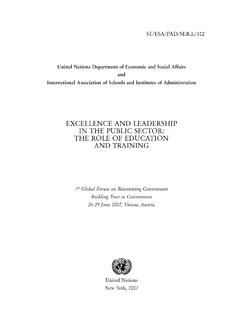Transcription of Traditional Public Administration versus The New Public ...
1 1 Published in Institutionenbildung in Regierung und Verwaltung: Festschrift fur Klaus Konig, A. Benz, H. Siedentopf, and Sommermann, eds. (Berlin,Germany: Duncker & Humbolt, 2004), pp. 443-454. Traditional Public Administration versus The New Public Management: Accountability versus Efficiency James P. Pfiffner George Mason University The development of the classical model of administrative owes much to the administrative tradition of Germany and the articulation of the principles of bureaucracy by Max Weber. The development of modern bureaucracies made possible the industrial revolution and the breakthroughs of modern economies. But at the end of the 20th century that classical model of Public Administration was challenged by what has been called the new Public management. This chapter will characterize the Traditional and the new Public management approaches to Public Administration and then compare them on three fundamental questions that every theory of Public Administration must answer: 1) what shall be done, policy direction; 2) who shall do it, personnel management; and 3) how to enforce compliance, i.
2 E. accountability. The conclusion will examine the tension between accountability and efficiency in Traditional Public Administration and the new Public management in answering the three fundamental questions posed above. I. Classical Public Administration The Traditional model of Public Administration rests in important ways on the articulation by Max Weber of the nature of bureaucracy. Weber emphasized control from top to bottom in the form of monocratic hierarchy, that is, a system of control in which policy is set at the top and carried out through a series of offices, with each manager and worker reporting to one superior and held to account by that person. The bureaucratic system is based on a set of rules and regulations flowing from Public law; the system of control is rational and legal.
3 the role of the bureaucrat is strictly subordinate to the political superior. Max Weber described the role of the civil servant and the importance of hierarchical control in a bureaucratic system: To take a stand, to be passionate .. is the politician s element .. indeed, exactly the opposite, principle of responsible from that of the civil servant. The honor of the civil servant is vested in his ability to execute conscientiously the order of the superior authorities..Without this moral discipline and self-denial, in the highest sense, the whole apparatus would fall to pieces. 1 While the system which Weber observed in Germany developed over several centuries, there was a parallel development of bureaucracy in other countries during the industrial This model of bureaucracy was crucial to the development of large scale enterprises, private or Public , throughout the developed world.
4 2 In the United States Public Administration Woodrow Wilson, later to become president, contributed to the Traditional model by arguing for the separation of Administration from political policy making. According to Wilson, citing as authority eminent German writers, .. Administration lies outside the proper sphere of politics. Administrative questions are not political questions. Although politics sets the tasks for Administration , it should not be suffered to manipulate its offices. 3 Wilson was one of the main proponents of the politics- Administration dichotomy which has been much reviled by later Public Administration scholars, but which has often been misunderstood. Those who dismiss the concept as obsolete take it as an empirical assertion about how Administration works in practice.
5 They observe that in fact, many high level civil servants have an important impact on policy, and thus dismiss the dichotomy. The real importance of the politics- Administration dichotomy, however, has to do with its normative That is, the principle implied by the dichotomy is that elected officials and their direct appointees have the legal right to make policy decisions for the polity, and it is the duty of career civil servants to carry out those policies in good faith. Thus it is the moral obligation of the dichotomy that is important, not its empirical content. Frederick Taylor made a contribution to the classical model with his time and motion studies and careful analysis of the role of managers and workers. His techniques and managerial practices were adopted widely in the United States and throughout the world in the early 20th century.
6 Taylor s Principles of Scientific Management, published in 1911, was translated into German, and Taylorism was popular with German engineers before and after World War Taylor s principles of management emphasized tight control of work processes and careful planning by managers. Although his management techniques have been used at times to control workers to the point of domination, his original ideas did not necessarily imply the exploitation of workers. The Traditional model of Public Administration spread throughout the industrialized world and ushered in the relative success of modern industrialized economies. Guy Peters summaries the principles of the Traditional model in the following list of its major characteristics: 1) An apolitical civil service; 2) Hierarchy and rules; 3) Permanence and stability; 4) An institutional civil service; 5) Internal regulation; 6) Equality (internally and externally to the organization).
7 6 Since this Traditional model was so successful in aiding the development of modern economies and Weber argued that it was the most efficient mode of organization possible, how could recent critics see it as old, outmoded, and inefficient? The answer is one of context and scale. In his historical context, Weber was comparing bureaucratic organization to charismatic and Traditional modes of organization. Clearly, bureaucracy is capable of more efficient organization than these other historical modes of domination. But the broader point is one of scale and time. If one wants to coordinate the actions of hundreds or thousands of people in any sophisticated endeavor (such as those that governments undertake) there is no realistic alternative to bureaucratic organization. Or if one wants a large scale enterprise to exist over a long time frame, from years to decades, one must organize it bureaucratically.
8 This does not mean that all elements of every large scale organization must adhere to each of Weber s ideal type criteria, but the general outlines must be there: hierarchy, continuity, files, etc. 3 When contemporary organizations are criticized for being inefficient, the implied comparison is with other contemporary organizations that sometimes work marginally better, not with completely different means of organization. In contemporary times, the most obvious alternative to bureaucracies is a market system; but in market systems large scale enterprises must be largely bureaucratic in order to exist over time ( Fortune 500 companies in the United States). Similarly the exhortations to devolve or decentralize within government does not mean abandoning bureaucracy as a form of organization. It merely means shifting some functions from a large, centralized bureaucracy to smaller or geographically separated bureaucracies.
9 As Klaus Konig points out, some aspects of the NPM are not incompatible with Traditional Public Administration : Yet a distinction must be made as regards this renewal movement between those of its components that are compatible with the bureaucratic Administration , even where it has a classical continental European character and those components which extend beyond the modernist, detail differentiations of state and Administration . The idea of decentral responsibility for resources, for instance, is perfectly familiar to an organizational scenery featuring federalism, local self-government, departmental responsibility, formal organizations under private law, shifts of functions to external bodies and so Thus the point of departure for the new Public management prescriptions is not non-industrialized economies or non-developed countries.
10 The NPM rather wants to improve fully developed governments at the margins. As we have learned from Russia after the fall of Communism, market capitalism in the absence of a strong system of business law, enforcement of contracts, and a regulatory structure can easily lead to lawlessness and the private use of force to enforce contracts (or to break them). According to World Bank President James D. Wolfensohn, developing economies need: good governance with a system of laws, a justice system that enforces the laws ( a contract system and bankruptcy laws), a financial system with accountable financial institutions, and a just social Without these prerequisites, economic development is impossible; and these prerequisites depend on a Traditional form of Public Administration (which is not to say that NPM ideas are never relevant to developing countries).
